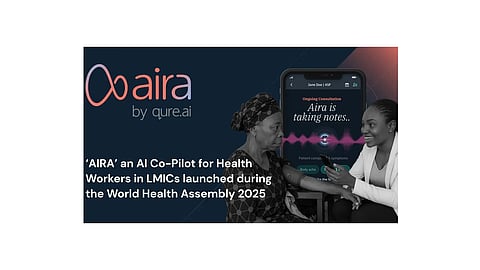

Qure.ai, a leader in digital health innovation, unveiled its new AI-driven co-pilot, AIRA, at the 78th World Health Assembly in Geneva. Designed specifically for frontline healthcare workers in low- and middle-income countries (LMICs), AIRA aims to transform how care is delivered in resource-constrained environments.
AIRA assists healthcare workers by digitizing symptom collection and patient histories, guiding adherence to clinical protocols, and generating population-level health insights. This tool is built on advanced Large Language Models (LLMs) and tailored to understand the unique challenges of LMIC healthcare systems.
With LMICs facing 17 million preventable deaths and a projected shortfall of 11 million healthcare workers by 2030, AIRA offers a timely solution. Currently, more than 40% of a community health worker’s time is consumed by manual data entry. AIRA automates these tasks, freeing up time for direct patient care and enabling better-informed healthcare decisions at scale.
“At Qure.ai, we believe AI can be a catalyst for health equity,” said Prashant Warier, CEO and Founder of Qure.ai. “AIRA empowers healthcare workers by streamlining data collection and supporting better clinical decision-making. Over the past decade, we've demonstrated this impact in tuberculosis management. Now, we’re applying that success to strengthen primary healthcare.”
Dr. Michel Sidibé, Special Envoy to the African Union, emphasized the need for innovation in LMICs: “Governments in these regions operate with limited budgets. To deliver high-quality healthcare, we must turn to digital and AI tools that improve efficiency, access, and outcomes.”
AIRA represents a significant step forward in leveraging artificial intelligence to reduce administrative burdens, promote protocol compliance, and enhance healthcare delivery—amplifying the effectiveness of each healthcare worker in LMICs.